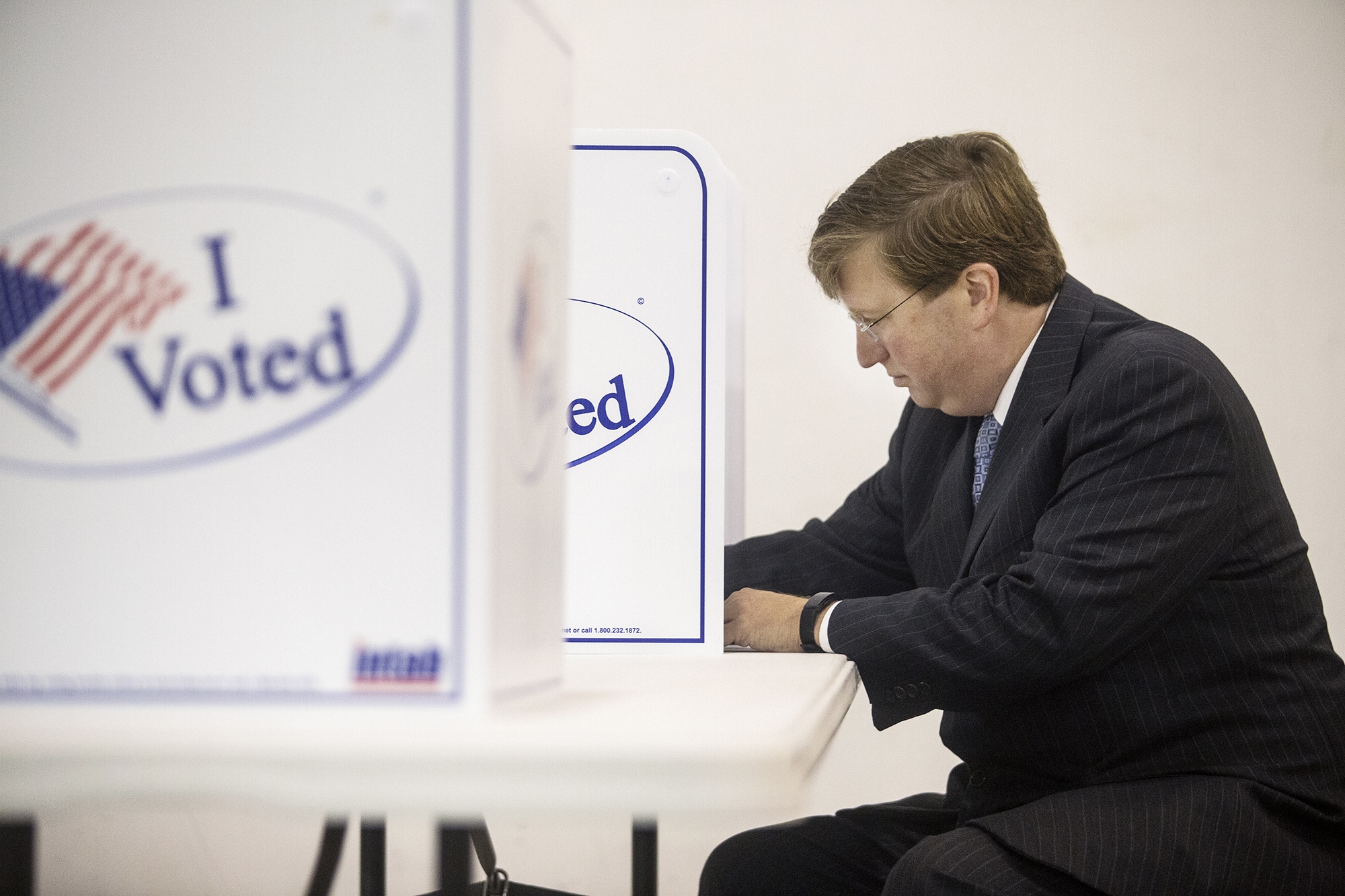Mississippi Today
Key legislator wants runoff provision for all Mississippi elections

Legislation passed by voters would have enacted runoff elections for the first time in Mississippi history if a candidate for any of the eight statewide offices had failed to garner a majority vote last week.
At least one key legislator wants to extend runoffs to all offices – both local and districtwide, such as elections for legislative seats or county positions. Senate Elections Chair Jeff Tate, R-Meridian, says he will file a bill in the upcoming 2024 session to create runoffs for all offices in Mississippi.
“I don't want to see people elected with a small percentage of the vote,” said Tate. “We want to see people elected with support from a majority of the electorate. I do not know what the appetite of the (Elections) Committee is to consider that. But I will file that bill.”
Tate is in position to have input on the runoff issue as chair of the Senate Elections Committee. There is no guarantee Lt. Gov Delbert Hosemann will reappoint Tate as Elections Committee chair for the new four-year term starting in January, though it would be unusual for him not to be reappointed.
A runoff can occur in statewide offices between the top two vote-getters when no candidate obtains a majority of the vote, or 50% plus one. A runoff was enacted for the office of governor and the other seven statewide elections in 2020 when the Mississippi Constitution was changed to remove an antiquated provision that mandated the state House select a winner from the top two vote-getters for any statewide office where no candidate obtained a majority of the popular vote and won the most votes in a majority of the House districts.
During the recently completed 2023 November general election, there was a candidate receiving a majority vote in each of the eight statewide elections, thus eliminating the need for a runoff. Incumbent Republican Gov. Tate Reeves came the closest to not capturing the majority vote in his reelection bid against Democrat Brandon Presley. With votes still being counted, Reeves is winning win 52% of the vote and avoiding a runoff by about 25,110 votes.
The publicity surrounding the possibility of a runoff for the eight statewide posts confused many people into thinking there would be runoffs possible in all general elections. At one point after the Nov. 7 election, some counties in southwest Mississippi believed there would be runoffs in supervisors elections where no candidate garnered a majority vote.
But that was not the case, though Tate would like it to be.
The original 1890 Constitution mandated runoffs if no candidate obtained a majority vote in party primary elections, but not general elections. Instead, the constitution contained the language sending the eight statewide offices to the House to be decided.
There have been many instances in Mississippi history of candidates winning general elections with less than a majority vote. For instance, in 1987 Margaret “Wootsie” Tate won the state Senate District 47 post on the Gulf Coast with 42% of the vote in a three-way race.
Perhaps the most notable instance of a Mississippi politician winning an important seat without garnering a majority vote came in the 1978 race for the open U.S. Senate seat when Republican Thad Cochran won the three-way race with 45% of the vote. Cochran went on to win six more contests for the U.S. Senate – most by comfortable margins or with no opposition. There was not in 1978 and still is no requirement for a runoff in a general election for a federal office in Mississippi.
Under the state constitution, if a non-statewide general election is a tie, its outcome is to be determined by a game of chance. Mississippi has over the years seen some races determined by drawing of straws or some other game of chance.
Mississippi, Louisiana and Georgia are the only states with general election runoff provisions. And the dynamics are different in Louisiana since there are no party primaries. In Louisiana candidates from all parties run together and if a candidate does not obtain a majority vote the top two vote-getters advance to a runoff.
Some states are beginning to enact what is known as ranked-choice voting. The system allows voters to select a top choice for an office and then a second choice, third choice and so on.
If a candidate wins a majority of the vote, the ranked-choice voting is not a factor. But if no candidate wins a majority, the losing candidate is eliminated and the votes of that candidate go to other candidates based on the rankings voters gave to the losing candidate.
This article first appeared on Mississippi Today and is republished here under a Creative Commons license.
Did you miss our previous article…
https://www.biloxinewsevents.com/?p=305721
Mississippi Today
On this day in 1896


MAY 18, 1896

The U.S. Supreme Court ruled 7-1 in Plessy v. Ferguson that racial segregation on railroads or similar public places was constitutional, forging the “separate but equal” doctrine that remained in place until 1954.
In his dissent that would foreshadow the ruling six decades later in Brown v. Board of Education, Justice John Marshall Harlan wrote that “separate but equal” rail cars were aimed at discriminating against Black Americans.
“In the view of the Constitution, in the eye of the law, there is in this country no superior, dominant, ruling class of citizens,” he wrote. “Our Constitution in color-blind and neither knows nor tolerates classes among citizens. In respect of civil rights, all citizens are equal before the law. The humblest is the peer of the most powerful. The law … takes no account of his surroundings or of his color when his civil rights as guaranteed by the supreme law of the land are involved.”
This article first appeared on Mississippi Today and is republished here under a Creative Commons license.
Did you miss our previous article…
https://www.biloxinewsevents.com/?p=359301
Mississippi Today
Renada Stovall, chemist and entrepreneur
Renada Stovall sat on the back deck of her rural Arkansas home one evening, contemplating life when she had a life-altering epiphany…
“I gotta get out of these woods.”
She heard it as clear as lips to her ear and as deep as the trees surrounding her property. Stovall's job as a chemist had taken her all over the country. In addition to Arkansas, there were stints in Atlanta, Dallas and Reno. But she was missing home, her parents and friends. She also knew, she needed something else to do.
“I thought, what kind of business can I start for myself,” said Stovall, as she watered herbs growing in a garden behind her south Jackson home. Some of those herbs are used in her all-natural products. “I know when I lived in Reno, Nevada, where it's very hot and very dry, there really weren't products available that worked for me, my hair, and my skin suffered. I've got a chemistry degree from Spelman College. I took the plunge and decided to create products for myself.”

In 2018, Stovall's venture led to the creation of shea butter moisturizers and natural soaps. But she didn't stop there, and in December 2022, she moved home to Mississippi and got to work, expanding her product line to include body balms and butters, and shampoos infused with avocado and palm, mango butter, coconut and olive oils.
Nadabutter, which incorporates Renada's name, came to fruition.

Stovall sells her balms and moisturizers at what she calls, “pop-up markets,” across the state during the summer. She's available via social media and also creates products depending on what of her ingredients a customer chooses. “My turmeric and honey is really popular,” Stovall added.
“The all-natural ingredients I use are great for conditioning the skin and hair. All of my products make you feel soft and luscious. The shea butter I use comes from West Africa. It's my way of networking and supporting other women. And it's my wish that other women can be inspired to be self-sufficient in starting their own businesses.”





This article first appeared on Mississippi Today and is republished here under a Creative Commons license.
Mississippi Today
On this day in 1954
MAY 17, 1954

In Brown v. Board of Education and Bolling v. Sharpe, the U.S. Supreme Court unanimously ruled that the “separate but equal” doctrine in Plessy v. Ferguson was unconstitutional under the 14th Amendment, which guaranteed equal treatment under the law.
The historic decision brought an end to federal tolerance of racial segregation, ruling in the case of student Linda Brown, who was denied admission to her local elementary school in Topeka, Kansas, because of the color of her skin.
In Mississippi, segregationist leaders called the day “Black Monday” and took up the charge of the just-created white Citizens' Council to preserve racial segregation at all costs.
This article first appeared on Mississippi Today and is republished here under a Creative Commons license.
-
SuperTalk FM6 days ago
Martin Lawrence making 3 stops in Mississippi on comedy tour
-
Our Mississippi Home4 days ago
Beat the Heat with Mississippi’s Best Waterparks
-
SuperTalk FM1 day ago
State auditor cracking down on Mississippians receiving unemployment benefits
-
Our Mississippi Home5 days ago
Charlie’s U-Pik: Opening Soon for the Summer Season
-
Mississippi News Video4 days ago
Jackson has a gang problem
-
Kaiser Health News5 days ago
Medicaid ‘Unwinding’ Decried as Biased Against Disabled People
-
228Sports4 days ago
George County Pours Runs In 6A South State Title Victory At PRC
-
Local News24 hours ago
Family files lawsuit after teen’s suicide in Harrison County Jail










































